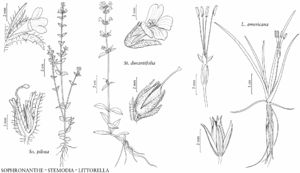Difference between revisions of "Sophronanthe pilosa"
Fl. S.E. U.S., 1067, 1338. 1903.
FNA>Volume Importer |
FNA>Volume Importer |
||
| Line 22: | Line 22: | ||
|name=G. pilosa var. epilis | |name=G. pilosa var. epilis | ||
|authority=Pennell | |authority=Pennell | ||
| − | }}{{Treatment/ID/Synonym | + | }} {{Treatment/ID/Synonym |
|name=Tragiola pilosa | |name=Tragiola pilosa | ||
|authority=(Michaux) Small & Pennell | |authority=(Michaux) Small & Pennell | ||
| Line 40: | Line 40: | ||
|elevation=0–700 m. | |elevation=0–700 m. | ||
|distribution=Ala.;Ark.;Del.;Fla.;Ga.;Ky.;La.;Md.;Miss.;N.J.;N.C.;Okla.;S.C.;Tenn.;Tex.;Va. | |distribution=Ala.;Ark.;Del.;Fla.;Ga.;Ky.;La.;Md.;Miss.;N.J.;N.C.;Okla.;S.C.;Tenn.;Tex.;Va. | ||
| − | |discussion=<p>Plants with glabrous stems and leaves have been named Gratiola pilosa var. epilis. The combination for that taxon in Sophronanthe has not been made.</p> | + | |discussion=<p>Plants with glabrous stems and leaves have been named <i>Gratiola</i> pilosa var. epilis. The combination for that taxon in <i>Sophronanthe</i> has not been made.</p> |
|tables= | |tables= | ||
|references= | |references= | ||
| Line 64: | Line 64: | ||
|publication year=1903 | |publication year=1903 | ||
|special status=Selected by author to be illustrated;Endemic | |special status=Selected by author to be illustrated;Endemic | ||
| − | |source xml=https://jpend@bitbucket.org/aafc-mbb/fna-data-curation.git/src/ | + | |source xml=https://jpend@bitbucket.org/aafc-mbb/fna-data-curation.git/src/8f726806613d60c220dc4493de13607dd3150896/coarse_grained_fna_xml/V17/V17_671.xml |
|genus=Sophronanthe | |genus=Sophronanthe | ||
|species=Sophronanthe pilosa | |species=Sophronanthe pilosa | ||
Revision as of 16:02, 18 September 2019
Stems erect, 20–65 cm, villous, rarely glabrous. Leaves: blade lanceolate to ovate, 8–20 × 4–13 mm, base clasping, rounded to subcordate, margins entire or serrate, not or slightly revolute, apex rounded to obtuse or acute, surfaces villous, rarely glabrous, papillate, distinctly punctate abaxially. Pedicels 0–3(–5) mm; bracteoles 6–9(–11) mm. Flowers: calyx lobes 5–7 × 0.5–1.5 mm; corolla tubular, 5–9 mm, tube yellow, veins bluish purple, limb white. Capsules conic, 4–5 × 2–2.8 mm. Seeds 0.2–0.4 mm. 2n = 22.
Phenology: Flowering May–Oct.
Habitat: Sandy pinelands, bogs, swamps, cypress-gum depressions, pine savannas, wet flatwoods.
Elevation: 0–700 m.
Distribution
Ala., Ark., Del., Fla., Ga., Ky., La., Md., Miss., N.J., N.C., Okla., S.C., Tenn., Tex., Va.
Discussion
Plants with glabrous stems and leaves have been named Gratiola pilosa var. epilis. The combination for that taxon in Sophronanthe has not been made.
Selected References
None.
